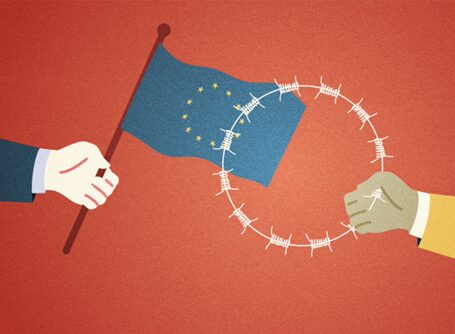Policy of non-welcome: fortress Europe continues to put up more walls
In recent months the EU and its member states have been trying to accelerate the implementation of the Pact on Migration and Asylum (see the newsletter from March 2024 for more details) and to make the EU’s legislation on this topic more restrictive. Their objective is doing so is clear: to welcome fewer people and to move them on to other countries.

© Migreurop
Recently, the European Commission has proposed several alarming new measures: modifying the rules surrounding the asylum procedure, revising the directive on “return” – a text that outlines how and when people in irregular situations or refused asylum seekers can be expelled from a country – and applying certain key measures of the new Pact in advance.
We find several of these measures to be concerning:
-
Redefining the notion of a “return country”: up till now, people could be returned to their countries of origin, to transit countries that have readmission agreements or to any country that the person would accept to be sent to. But the individual’s consent was at the heart of this choice. However, under the new proposal, exiles could be expelled to countries they have never been to before, that they know nothing about and that they have not agreed to being sent to. This would be done under the pretext that these countries will analyse their requests for asylum and will offer them “protection”.
-
The creation of a European list of “safe third countries” where requests for asylum can be analysed: this concept allows countries to transfer asylum seekers to third countries that have been deemed “safe” instead of processing their requests in the countries where they asked for asylum. The EU intends to create a unique list of countries where people who are seeking asylum can be sent whilst their requests are being processed.
-
Harmonising the lists of “safe countries of origin”: in the past each Member State had their own national lists so that they could quickly process requests by saying that people from certain countries do not need international protection. Of course, it was questionable whether people’s safety would really be guaranteed in some of the countries on these lists. Now a single, legally-binding list will be imposed on all Member States, supposedly for the sake of harmonising things all throughout the EU.
Currently this list includes: Kosovo, Bangladesh, Colombia, Egypt, India, Morocco, Tunisia and the EU’s candidate countries: Albania, Bosnia-Herzegovina, Georgia, North Macedonia, Moldova, Montenegro, Serbia, Turkey and Ukraine. However, several of these countries are often criticised for serious human rights violations – meaning that asylum seekers from these countries may require international protection. Several associations have already sounded the alarm bell regarding such an arbitrary list: it will prevent a large number of vulnerable people from getting the protection they deserve.
-
The early entry into force of key measures of the new Pact: now Member States can implement accelerated procedures for people who come from countries where the average rate of protection granted within the EU is less than or equal to 20%. An accelerated procedure means a superficial analysis of the request for asylum which will, most often, lead to a rejection and the person being deported.
🡪 These legal developments may seem, at first glance, like mere technical changes, but they actually mark a serious change in EU migration policy: the gradual destruction of the very spirit of the right of asylum here in Europe. Just a reminder that the Geneva Convention states that all individuals have the right to request asylum if they are being persecuted for reasons of race, religion, nationality, membership of a particular social group or political opinion. The signatories of the convention must protect refugees and not return them to countries where their lives or freedoms would be threatened.
The aforementioned reforms are still being worked on, but it remains highly likely that the European Parliament and the European Council will soon approve these changes.
Emmaus Europe has been closely monitoring this situation alongside our partners, Migreurop and the ECRE. We will be attending the ECRE’s Annual General Conference in June to discuss these topics and we are currently working with them on the ECRE’s advocacy plan for the next four years.




